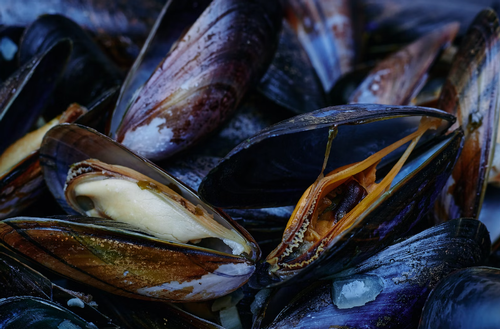TUESDAY, JANUARY 16, 2024
Specialty materials company Mussel Polymers, Inc., recently received a contract from the U.S Air Force’s AFWERX unit to develop biomimetic, anti-corrosive coating technology to protect deployed equipment, vehicles and structures.
According to a release from the company, the SBIR Phase I contract is expected to help address this issue with corrosion, which costs the Department of the Air Force (DAF) around $20 billion each year.
About the Contract
MPI states in its release that M-Clad is its new anti-corrosive coating technology and is reportedly an extension of the company’s patented Poly thin-film applications, which include improved adhesion on wet and low energy surfaces.
"AFRL's selection of PCS for testing, provides a robust test bed of the value and effectiveness of MPI's M-Clad anticorrosive coating," said Jason Stieg, Chief Commercial Officer of Mussel Polymers.

 |
| Gil Ndjouwou / Unsplash |
|
Specialty materials company Mussel Polymers, Inc., recently received a contract from the U.S Air Force’s AFWERX unit to develop biomimetic, anti-corrosive coating technology to protect deployed equipment, vehicles and structures. |
The release adds that the Air Force Research Laboratory and AFWERX have joined together better organize the Small Business Innovation Research (SBIR) and Small Business Technology Transfer (STTR) process by:
The DAF reportedly started offering the Open Topic SBIR/STTR program in 2018, expanding the range of projects the DAF funded. Now, MPI states that it will start creating and providing capabilities that could help improve the national defense of the U.S.
About the Coatings
In October 2022, a coating from MPI was used to strengthen carbon and aramid fibers, allowing for stronger, more lightweight materials.
Using poly catechol styrene (PCS), which is a polymer that mimics the adhesive used by mussels to adhere to underwater substrates, the company reported that the application can increase the strength and impact energy of fiber reinforced materials.
Launched in 2019, MPI developed adhesive solutions building from its base technology, licensed from Purdue University, at the Ben Franklin Technology Facility in Bethlehem, Pennsylvania. The company commercialized products based on its biomimetic PCS, ranging from dental adhesives to defense ships and vehicles.
While mussel peptides cure quickly underwater, they are complex and prohibitively expensive. To resolve this, MPI developed the synthetic version through biomimetics to ensure commercial viability.
John Wilker, inventor of the PCS system and Professor of Chemistry at Purdue University with the backing of the Office of Naval Research, figured out a way to copy the function of the mussel glue in a simpler highly effective molecule.
According to the company’s website, PCS is nontoxic, binds underwater and is environmentally friendly. The polymer is reportedly 300% stronger when compared to other commercial underwater adhesives.
It can attach to a wide range of materials including, but not limited to wood, steel, aluminum, styrene, acrylic, urethane, epoxy, polyester, TPU and TPO.
PCS priming reportedly makes other adhesives stronger and can bond to wet surfaces. It also can be combined with any chemistry with a long shelf life, the company says.
MPI announced that it had successfully coated carbon and aramid fibers with PCS, marking a step forward in producing lighter, stronger fiber reinforced composites.
According to the press release, the application was likely to significantly increase the strength and impact energy of fiber reinforced materials. Additionally, it was anticipated to improve the use of coatings and adhesives with carbon fiber parts and materials.
Other Mussel-Inspired Coatings
In August of last year, engineers at the University of Bath in England developed a new kind of polymer-coated membrane that could separate chemicals for water filtration. The thin-film composite nanoporous membrane (TFC NPM) reportedly had the capability to separate salts and other chemical components from wastewater.
According to the release, the development presented a new opportunity for industries to improve sustainability, while extracting valuable by-products and chemicals from water that could then be reused.
The development was published in the journal Nature Water, detailing the membrane’s performance and explaining how its properties are reportedly inspired by mussels. The release said that this could pave the way for a more sustainable management of water within industries such as pharmaceuticals, oil and gas, textiles and food processing.
The paper was authored by academics from the University of Bath alongside colleagues based in China, South Korea, Singapore, Australia and Belgium.
The coating was reportedly made up of the polymer polyethyleneimine (PEI) and polydopamine (PDA), a compound which mussels excrete and use to stick to rocks or wood in wet conditions. The coating’s stickiness, according to the release, makes the membrane highly selective, allowing water to pass through but blocking other compounds and organic materials.
The multi-stage process reportedly results in improved filtration of the water and a highly efficient, low-energy way to fractionate, or separate, chemicals individually.
The researchers stated that the membrane could replace current equivalents used in electrodialysis, a process for treating water by transporting ions through membranes from one solution to another under an electrical current.
Tagged categories: Adhesion; Automotive coatings; Aviation; Coating Application; Coating chemistry; Coating Materials; Coatings; Coatings Technology; Environmental Controls; Government; Marine Coatings; Program/Project Management; Research; Research and development; U.S. Air Force; U.S. Army